theartsdesk on Vinyl 62: Nick Mulvey, Off The Meds, Black Keys, Kreator, Oneohtrix Point Never, Sam Cooke and more | reviews, news & interviews
theartsdesk on Vinyl 62: Nick Mulvey, Off The Meds, Black Keys, Kreator, Oneohtrix Point Never, Sam Cooke and more
theartsdesk on Vinyl 62: Nick Mulvey, Off The Meds, Black Keys, Kreator, Oneohtrix Point Never, Sam Cooke and more
The largest, loudest, longest reviews of music on plastic

The top-selling vinyl at independent UK record shops in 2020 was Idles' latest album (closely followed by Yungblud, which is impressive, given his only came out in December!). The Top 10 is dominated by indie, rock and retro but, actually, the bigger picture is that limited runs by music in all styles are selling across the board.
VINYL OF THE MONTH
Alostmen Kologo (Strut)
 This album is punkin’. It hails from Ghana but before we hit all that Songlines-y stuff, first and foremost know that Kologo bleeds energy like an exploding nuclear power station. The kologo is a type of lute played by band-leader Stevo Atembire who attacks it and adapts it to create his own particular sound. The press release tells us that the music is “based around the Frafra traditions”, the Frafra being an African people spread between Burkina Faso and Ghana. This writer is not qualified to comment on that, but what’s certain is the combination of Atembire’s relentless kologo-ing, accompanied by djembe, conga, one string fiddle, and more, packs a punch. What seals the deal is the range of vocals, from sing-along choruses to hip hop inflections to raw roosty local styles, sometimes in English, sometimes not. Atembire and co-producer Wanlov the Kubolor are versed in many styles, including electronica and Balkan music, as is made clear in the 12” x 12” four page insert of tightly written background info. This production knowledge is the final ingredient, resulting in a sound that’s hypnotic and dogged in its persistence, yet also hard to resist. Live in concert they must absolutely kill it. Roll on festival season 2022.
This album is punkin’. It hails from Ghana but before we hit all that Songlines-y stuff, first and foremost know that Kologo bleeds energy like an exploding nuclear power station. The kologo is a type of lute played by band-leader Stevo Atembire who attacks it and adapts it to create his own particular sound. The press release tells us that the music is “based around the Frafra traditions”, the Frafra being an African people spread between Burkina Faso and Ghana. This writer is not qualified to comment on that, but what’s certain is the combination of Atembire’s relentless kologo-ing, accompanied by djembe, conga, one string fiddle, and more, packs a punch. What seals the deal is the range of vocals, from sing-along choruses to hip hop inflections to raw roosty local styles, sometimes in English, sometimes not. Atembire and co-producer Wanlov the Kubolor are versed in many styles, including electronica and Balkan music, as is made clear in the 12” x 12” four page insert of tightly written background info. This production knowledge is the final ingredient, resulting in a sound that’s hypnotic and dogged in its persistence, yet also hard to resist. Live in concert they must absolutely kill it. Roll on festival season 2022.
Various Not From Where I’m Standing (Come Play With Me)
 The Come Play With Me organization, which “exists to support people in Yorkshire attempting to acquire a sustainable career in music”, not only does that but also has a high hit rate for quality. Their label wing gave us one of 2020’s compilations of the year in Come Stay With Me, and now presents a double set of Bond theme covers, pulled together by David Gedge and The Wedding Present and featuring members and ex-members of that band and of Gedge’s other oufit, Cinerama. I have a longstanding dislike of The Wedding Present’s music but this collection is ace. It’s certainly not just a bunch if indie guitar covers, as one might suspect, although there are some of them (notably Sleeper and Gedge doing “Mr Kiss Kiss Bang Bang”), but even these are saved by the twangy contagiousness of the songs. The best material ranges from the bizarre low-fi keyboard instrumental cover of “All Time High” by Minitel to Maria Scaroni’s delicious re-reading of “The World is Not Enough”; in fact the later, less-loved themes come out of things especially well, their solid tunes disconnected from the bombast and stylistic singing tics of the originals. There’s a snifter of Nouvelle Vague's schtick here and there, but never too much. For pure out-there-ness, Follow The Moths' oddball post-punk take on “Goldeneye” is a particular treat, and The Ukrainians' smash-up version of “Die Another Day”, and… Hell, just check it all out. All profits go to the mental health charity CALM, so there’s an added incentive. Comes on double in info inner sleeves.
The Come Play With Me organization, which “exists to support people in Yorkshire attempting to acquire a sustainable career in music”, not only does that but also has a high hit rate for quality. Their label wing gave us one of 2020’s compilations of the year in Come Stay With Me, and now presents a double set of Bond theme covers, pulled together by David Gedge and The Wedding Present and featuring members and ex-members of that band and of Gedge’s other oufit, Cinerama. I have a longstanding dislike of The Wedding Present’s music but this collection is ace. It’s certainly not just a bunch if indie guitar covers, as one might suspect, although there are some of them (notably Sleeper and Gedge doing “Mr Kiss Kiss Bang Bang”), but even these are saved by the twangy contagiousness of the songs. The best material ranges from the bizarre low-fi keyboard instrumental cover of “All Time High” by Minitel to Maria Scaroni’s delicious re-reading of “The World is Not Enough”; in fact the later, less-loved themes come out of things especially well, their solid tunes disconnected from the bombast and stylistic singing tics of the originals. There’s a snifter of Nouvelle Vague's schtick here and there, but never too much. For pure out-there-ness, Follow The Moths' oddball post-punk take on “Goldeneye” is a particular treat, and The Ukrainians' smash-up version of “Die Another Day”, and… Hell, just check it all out. All profits go to the mental health charity CALM, so there’s an added incentive. Comes on double in info inner sleeves.
Nick Mulvey Begin Again (Fiction)
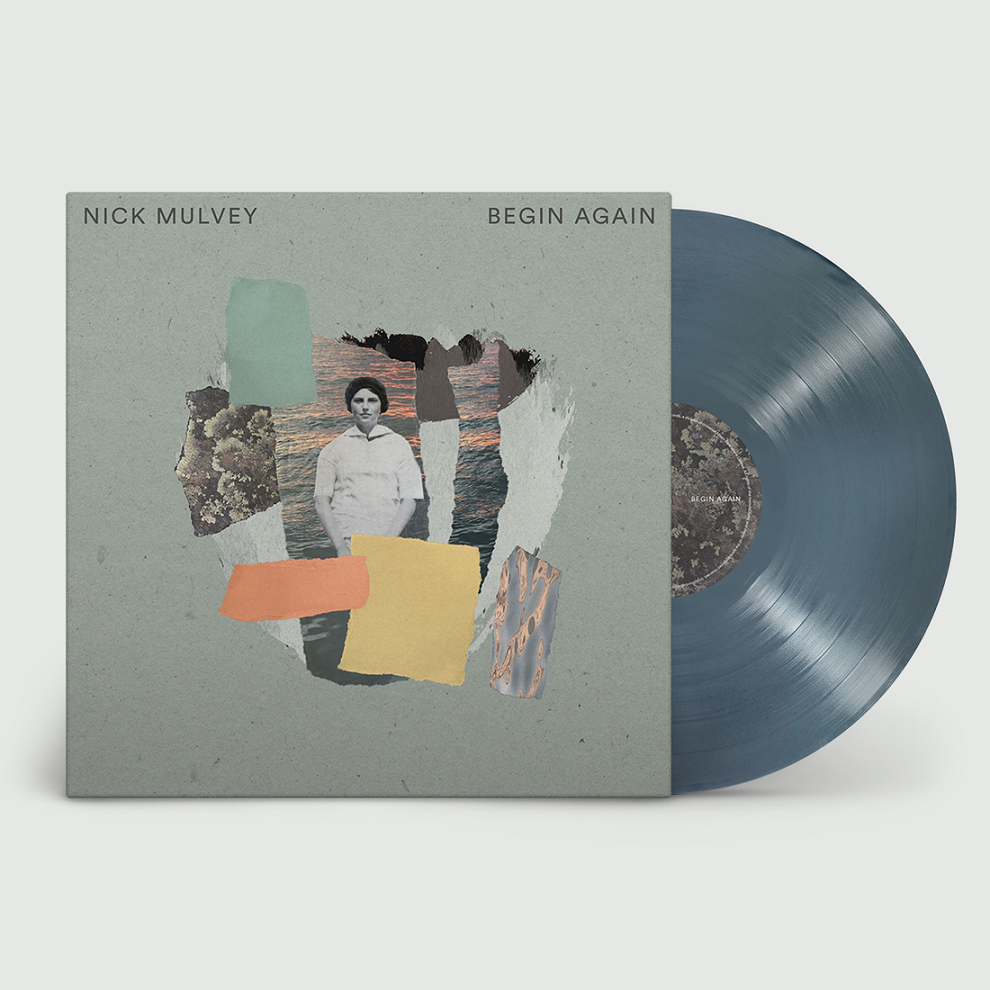 Singer-songwriter Nick Mulvey paves the way for his third album with a four track 12” single. It's no secret that theartsdesk on Vinyl has a conflicted relationship with acoustic guitar singer-songwriters. Mostly this is due to their weedy, “poor me” solipsism, musical lack of imagination and feeble poetry, but Mulvey stands far outside the pack. His guitar style is unique, melding Hispanic picking with his own reinterpretation of minimalism à la Terry Riley, Steve Reich et al. The title track is an autobiographical meditation on the nature of time, harking back to the best of his work so far, cosmic yet earthy, complex yet simple, thoughtful yet uplifting. Elsewhere we find the Indian-sounding tunings of “Hope She’ll Be Happier” and the spacey, faintly psychedelic “Third Way”. There’s also a Little Dragon remix of the title track which is a passable backroom 4/4 plodder. Comes on vinyl that’s a dull teal blue, but there’s no sign that Nick Mulvey's light is burning any less brightly.
Singer-songwriter Nick Mulvey paves the way for his third album with a four track 12” single. It's no secret that theartsdesk on Vinyl has a conflicted relationship with acoustic guitar singer-songwriters. Mostly this is due to their weedy, “poor me” solipsism, musical lack of imagination and feeble poetry, but Mulvey stands far outside the pack. His guitar style is unique, melding Hispanic picking with his own reinterpretation of minimalism à la Terry Riley, Steve Reich et al. The title track is an autobiographical meditation on the nature of time, harking back to the best of his work so far, cosmic yet earthy, complex yet simple, thoughtful yet uplifting. Elsewhere we find the Indian-sounding tunings of “Hope She’ll Be Happier” and the spacey, faintly psychedelic “Third Way”. There’s also a Little Dragon remix of the title track which is a passable backroom 4/4 plodder. Comes on vinyl that’s a dull teal blue, but there’s no sign that Nick Mulvey's light is burning any less brightly.
Star Feminine Band Star Feminine Band (Born Bad)
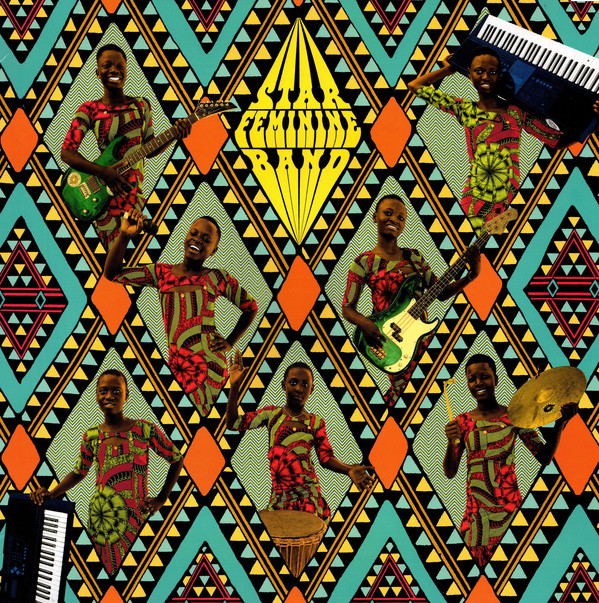 Star Feminine Band is an all-female septet from North Benin, aged between 10 and 16 years old. Consciously put together by the musician André Balaguemon as a response to the sluggish progress of women’s rights in the country, the album’s lyrics are in French and local languages such as Waama, Bariba and Fon but, when translated, many of them are boldly feminist (“Oh black woman, get up, don’t sleep/You can become president of the republic”!). Upbeat music led by guitar, organ and distinctively young voices, it’s a joyous bubbling recipe, influenced by Oumou Sangaré and, more explicitly, Angélique Kidjo, but more spontaneously thrown together. Indeed, it reminds this writer of the tween UK indie outfit Honey Hahs, not that it sounds like them, but something of the same unfiltered joy of that age group seeps through in the music, mingled with a wisdom beyond the creators’ years. Lovely stuff and comes with 12” x 36” fold-out photo/info pamphlet on the background that’s well worth a read.
Star Feminine Band is an all-female septet from North Benin, aged between 10 and 16 years old. Consciously put together by the musician André Balaguemon as a response to the sluggish progress of women’s rights in the country, the album’s lyrics are in French and local languages such as Waama, Bariba and Fon but, when translated, many of them are boldly feminist (“Oh black woman, get up, don’t sleep/You can become president of the republic”!). Upbeat music led by guitar, organ and distinctively young voices, it’s a joyous bubbling recipe, influenced by Oumou Sangaré and, more explicitly, Angélique Kidjo, but more spontaneously thrown together. Indeed, it reminds this writer of the tween UK indie outfit Honey Hahs, not that it sounds like them, but something of the same unfiltered joy of that age group seeps through in the music, mingled with a wisdom beyond the creators’ years. Lovely stuff and comes with 12” x 36” fold-out photo/info pamphlet on the background that’s well worth a read.
The Black Keys Brothers 7" Boxset (Nonesuch)
 A decade ago and a decade into their career The Black Keys hit the big time with their albums Brothers. Recorded at Muscle Shoals Studios in Alabama, it still sounds fab, and also, somehow, retains that loose Muscle Shoals sound, despite the studio being a shell of its former glories by the time the duo worked there. Brothers now reappears as a 7500 edition boxset of nine 7” singles. It includes the catchy, raw retro-blues pop of the original album but also contains three additional cuts, all equal to the rest; the bad girl stomper “Chop and Change” from the soundtrack to the vampire film The Twilight Saga: Eclipse, plus two previously unreleased goodies, the fuzzy surf-trash instrumental “Black Mud Part II” and the clanging, grinding toxic girlfriend blitz, “Keep My Name Outta Your Mouth”. The latter was probably not originally included as it would tip the album’s quotient of songs about iffy women into a zone that wouldn't sit well. The explanation is that the album was made following the near-split of the band, partly due to a particularly toxic relationship one of them had been involved in. There’s also a chunky booklet full of photos from the original session, a poster, some new words from Rolling Stone veteran David Fricke, and an additional gimmick, that the ink on the cover is heat sensitive. Since it’s currently perishing cold, all I can see are the words “The Black Keys”. Even when I rub it for ages I can only faintly make out the words you see in the image that accompanies this review. I hesitate to take a kettle to it…
A decade ago and a decade into their career The Black Keys hit the big time with their albums Brothers. Recorded at Muscle Shoals Studios in Alabama, it still sounds fab, and also, somehow, retains that loose Muscle Shoals sound, despite the studio being a shell of its former glories by the time the duo worked there. Brothers now reappears as a 7500 edition boxset of nine 7” singles. It includes the catchy, raw retro-blues pop of the original album but also contains three additional cuts, all equal to the rest; the bad girl stomper “Chop and Change” from the soundtrack to the vampire film The Twilight Saga: Eclipse, plus two previously unreleased goodies, the fuzzy surf-trash instrumental “Black Mud Part II” and the clanging, grinding toxic girlfriend blitz, “Keep My Name Outta Your Mouth”. The latter was probably not originally included as it would tip the album’s quotient of songs about iffy women into a zone that wouldn't sit well. The explanation is that the album was made following the near-split of the band, partly due to a particularly toxic relationship one of them had been involved in. There’s also a chunky booklet full of photos from the original session, a poster, some new words from Rolling Stone veteran David Fricke, and an additional gimmick, that the ink on the cover is heat sensitive. Since it’s currently perishing cold, all I can see are the words “The Black Keys”. Even when I rub it for ages I can only faintly make out the words you see in the image that accompanies this review. I hesitate to take a kettle to it…
Various Late Night Tales: Khruangbin (Night Time Stories)
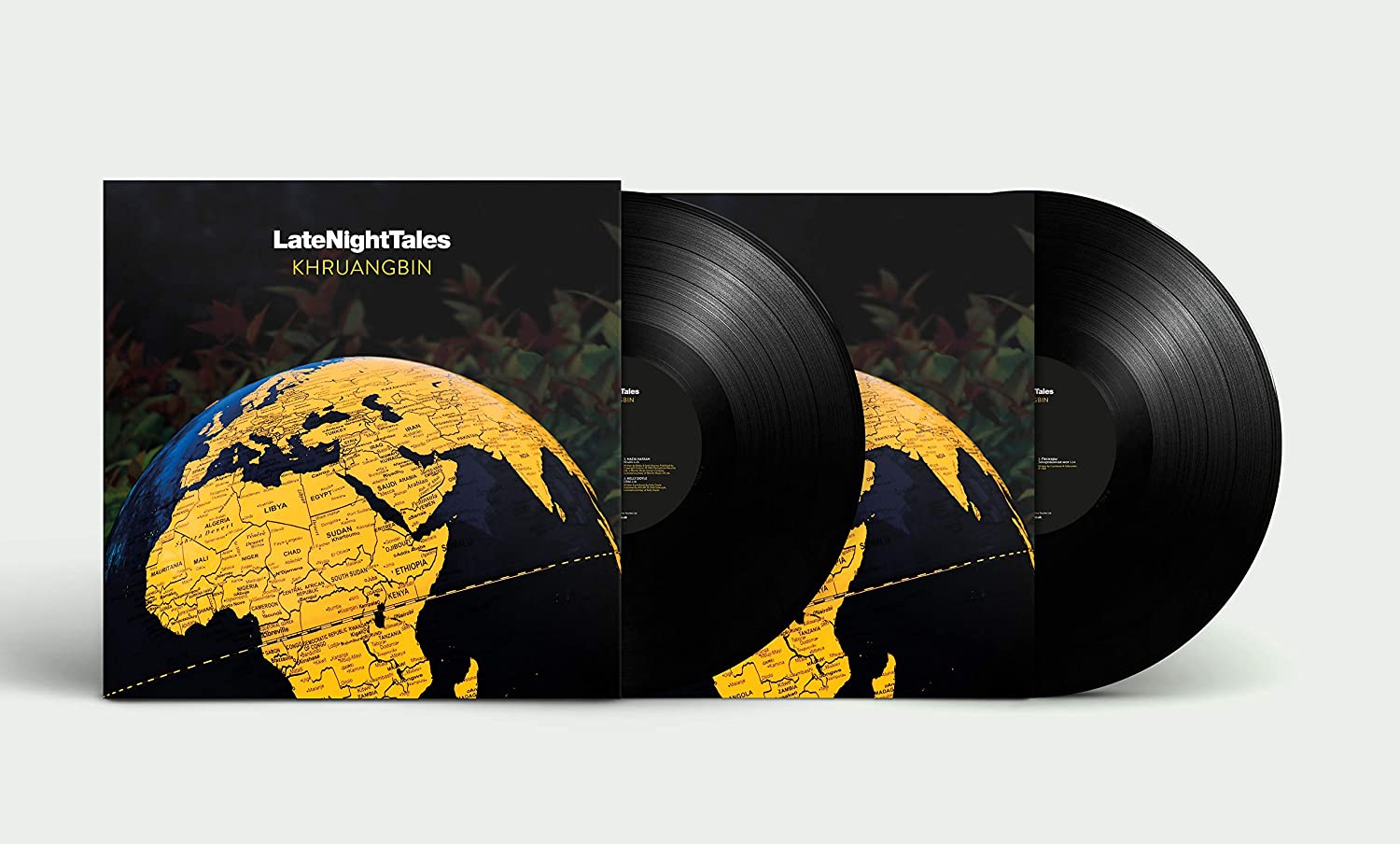 Given the Late Night Tales compilations have been going since dinosaurs walked the earth, the quality threshold has, generally, been pretty high. The series began after UK club culture had peaked and, in a way, provided its after-party, offering opportunities for tens of artists to pick their 3.00 AM living room song selection, from Snow Patrol and Franz Ferdinand to Jon Hopkins and Floating Points. Texan globalists Khruangbin are next up and they excel with a lively but ultra-obscure selection that runs the gamut through African party tunes, their dubbing Texan buddies Brilliantes del Vuelo, South Korean funk-rock, kitsch Japanese torch song, Russian easy listening, their own spacey cover of Kool and the Gang's “Summer Madness”, and a spoken word piece by Texan artist-storyteller Tierney Malone. It's sunshiney and never grows boring. Comes on double with a 12” x 12” card insert featuring the band explaining their choices.
Given the Late Night Tales compilations have been going since dinosaurs walked the earth, the quality threshold has, generally, been pretty high. The series began after UK club culture had peaked and, in a way, provided its after-party, offering opportunities for tens of artists to pick their 3.00 AM living room song selection, from Snow Patrol and Franz Ferdinand to Jon Hopkins and Floating Points. Texan globalists Khruangbin are next up and they excel with a lively but ultra-obscure selection that runs the gamut through African party tunes, their dubbing Texan buddies Brilliantes del Vuelo, South Korean funk-rock, kitsch Japanese torch song, Russian easy listening, their own spacey cover of Kool and the Gang's “Summer Madness”, and a spoken word piece by Texan artist-storyteller Tierney Malone. It's sunshiney and never grows boring. Comes on double with a 12” x 12” card insert featuring the band explaining their choices.
Kreator Under the Guillotine Boxset (BMG)
 I confess that until attending Download Festival 2018 I’d never really given Kreator much thought. They were just another metal band patch I’d seen on endless denim jackets, mostly back in the Eighties. Little did I know then that I would get so many kicks journeying into their musical world. At Download they performed a cartoonishly aggressive set, obsessed with killing and death in a way that was at once ghoulish pantomime yet viscerally intense. Turned out that their music, consumed outside Download, was just as crazed, and seeing them again in December 2019 sealed the deal (review here). Now they release a boxset, designed partly like a blood-stained guillotine, but also like the scrawl-covered wooden school desk of a Kreator fan. It contains their first six albums on wildly coloured, eye-boggling swirl vinyl, as well as a bunch of other stuff. The 1985 debut, Endless Pain, is crudely produced, slower-riffin’ than what followed, but with weight and intent (check the tattoo drum-fuelled “Total Death”). With 1986’s Pleasure to Kill, they match any kingpin of thrash from that period – Metallica, Slayer, etc – with their own pummelling derangement. It’s a complete riot and essential for fans of this style. The following year’s Terrible Certainty also holds its own, with frontman Mille Petrozza locating a secondary voice to use alongside his usual roar, a kind of barking rap to a marching beat, which comes to the fore on the title track. Extreme Aggression experiments with tempo and a broader musical palette (by Kreator’s standards!), as exemplified by “Some Pain Will Last”. Coma of Souls is basically more of the same but with decreasing impact. By this point Kreator had been turning out an album a year for five years, touring each one, so it may have suffered as a result. Renewal, however, the band took a couple of years over and they muster a different sound, exploring atmospherics, down-tuned grinding, and perhaps paying heed to the rising tide of bands such as Nine Inch Nails. After listening to the previous albums it comes across as a welcome step sideways, punkier and less fret-widdlingly metal than its predecessors. I like it but Kreator fans in 1992 did not and they were dropped by their label, Noise, which is how and why this boxset ends. It also contains a 40 page hardback book full of photos taken over the years, as well as words from Petrozza about background on songs and albums; a reproduction of the band’s album cassette demo End of the World (when they were still called Tormentor); a plastic Kreator USB demon figurine containing expanded editions of all the albums; and a DVD featuring interviews and live performances from the late-Eighties and early-Nineties as well as audio of two concerts from the same period and “an Andy Sneap remix of Live in Berlin 1990”. Petrozza, by the way, comes over as mellow to the point of comatose in the interviews, which is rather a surprise. He must save it all for wishing eternal bloody hell and fury from stages across the world. This is a really juicy collation of material for fans, entertainingly and fittingly packaged, however BMG have, once again cheaped out in one key way. Like the recent and similarly opulent Motörhead Ace of Spades boxset, Under the Guillotine's vinyl lacks depth in mastering; it seems to be pressed up from digital source, like taping a CD. However loud you turn up the new vinyl editions and however you try and balance the bass higher, there’s still an irritating emphasis on shrill frequencies. With music this noisy and battering, that’s a shame, and not just hi-fi geek niggling.
I confess that until attending Download Festival 2018 I’d never really given Kreator much thought. They were just another metal band patch I’d seen on endless denim jackets, mostly back in the Eighties. Little did I know then that I would get so many kicks journeying into their musical world. At Download they performed a cartoonishly aggressive set, obsessed with killing and death in a way that was at once ghoulish pantomime yet viscerally intense. Turned out that their music, consumed outside Download, was just as crazed, and seeing them again in December 2019 sealed the deal (review here). Now they release a boxset, designed partly like a blood-stained guillotine, but also like the scrawl-covered wooden school desk of a Kreator fan. It contains their first six albums on wildly coloured, eye-boggling swirl vinyl, as well as a bunch of other stuff. The 1985 debut, Endless Pain, is crudely produced, slower-riffin’ than what followed, but with weight and intent (check the tattoo drum-fuelled “Total Death”). With 1986’s Pleasure to Kill, they match any kingpin of thrash from that period – Metallica, Slayer, etc – with their own pummelling derangement. It’s a complete riot and essential for fans of this style. The following year’s Terrible Certainty also holds its own, with frontman Mille Petrozza locating a secondary voice to use alongside his usual roar, a kind of barking rap to a marching beat, which comes to the fore on the title track. Extreme Aggression experiments with tempo and a broader musical palette (by Kreator’s standards!), as exemplified by “Some Pain Will Last”. Coma of Souls is basically more of the same but with decreasing impact. By this point Kreator had been turning out an album a year for five years, touring each one, so it may have suffered as a result. Renewal, however, the band took a couple of years over and they muster a different sound, exploring atmospherics, down-tuned grinding, and perhaps paying heed to the rising tide of bands such as Nine Inch Nails. After listening to the previous albums it comes across as a welcome step sideways, punkier and less fret-widdlingly metal than its predecessors. I like it but Kreator fans in 1992 did not and they were dropped by their label, Noise, which is how and why this boxset ends. It also contains a 40 page hardback book full of photos taken over the years, as well as words from Petrozza about background on songs and albums; a reproduction of the band’s album cassette demo End of the World (when they were still called Tormentor); a plastic Kreator USB demon figurine containing expanded editions of all the albums; and a DVD featuring interviews and live performances from the late-Eighties and early-Nineties as well as audio of two concerts from the same period and “an Andy Sneap remix of Live in Berlin 1990”. Petrozza, by the way, comes over as mellow to the point of comatose in the interviews, which is rather a surprise. He must save it all for wishing eternal bloody hell and fury from stages across the world. This is a really juicy collation of material for fans, entertainingly and fittingly packaged, however BMG have, once again cheaped out in one key way. Like the recent and similarly opulent Motörhead Ace of Spades boxset, Under the Guillotine's vinyl lacks depth in mastering; it seems to be pressed up from digital source, like taping a CD. However loud you turn up the new vinyl editions and however you try and balance the bass higher, there’s still an irritating emphasis on shrill frequencies. With music this noisy and battering, that’s a shame, and not just hi-fi geek niggling.
Erland Dahlen Bones (Hubro) + Voice & Strings & Timpani Voice & Strings & Timpani (Hubro)
 Norwegian record label Hubro is beautifully out there. They have spent the last decade releasing albums that sit somewhere between jazz, modern classical and avant-garde improvisation. Their records have a look and presence and, while they sometimes contain too much pretentious farting about, it’s brilliant that they exist. If you bought a Hubro record at random, you’d be more than likely find something intriguing going on when the needle hit the plastic. These two are a case in point. Erland Dahlen is the go-to percussionist for Scandy jazzers and his fourth album is a selection of moody soundscapes that putter along at a level pace, suggesting you bed down into their steady revolving grooves. Voice & Strings & Timpani,
Norwegian record label Hubro is beautifully out there. They have spent the last decade releasing albums that sit somewhere between jazz, modern classical and avant-garde improvisation. Their records have a look and presence and, while they sometimes contain too much pretentious farting about, it’s brilliant that they exist. If you bought a Hubro record at random, you’d be more than likely find something intriguing going on when the needle hit the plastic. These two are a case in point. Erland Dahlen is the go-to percussionist for Scandy jazzers and his fourth album is a selection of moody soundscapes that putter along at a level pace, suggesting you bed down into their steady revolving grooves. Voice & Strings & Timpani, 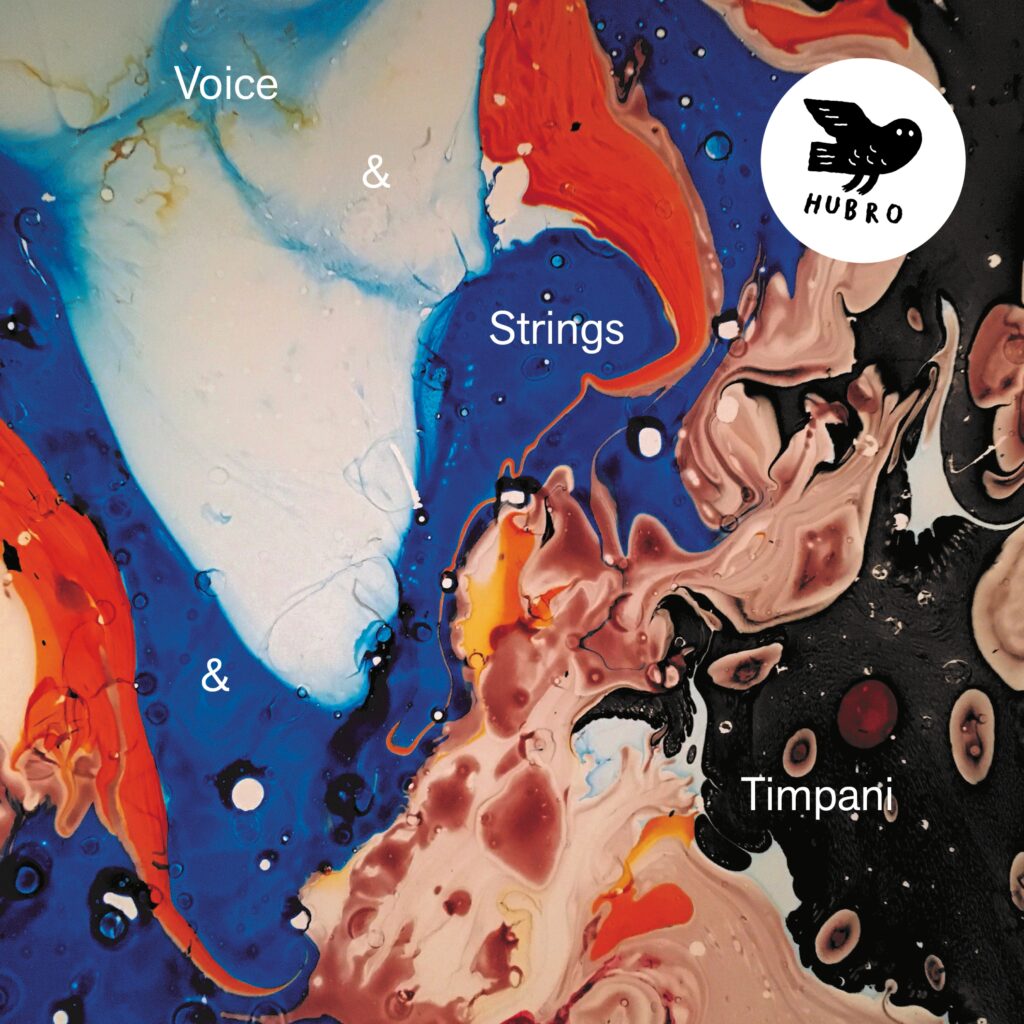 on the other hand, is the brainchild of Stephan Meidell and Øyvind Hegge-Lunde, regulars, so the press release tells us, of “the vibrant Bergen experimental music scene”. For me, this is the more engaging of the two records, built around classic serialist, minimalism patterns, with cut-up lyrics in French and English sung by two women (Mari Kvein Brunvoll of another Hubro outfit, Building Instrument, and German singer-producer Eva Pfitzenmaier). Ranging from the drum tattoo antics of “Swarming Strings Made Out of Light” to more contemplative material, it’s a head-spinning journey that’s po-faced in intent and tone but well worth taking. Both albums come in art inner sleeves.
on the other hand, is the brainchild of Stephan Meidell and Øyvind Hegge-Lunde, regulars, so the press release tells us, of “the vibrant Bergen experimental music scene”. For me, this is the more engaging of the two records, built around classic serialist, minimalism patterns, with cut-up lyrics in French and English sung by two women (Mari Kvein Brunvoll of another Hubro outfit, Building Instrument, and German singer-producer Eva Pfitzenmaier). Ranging from the drum tattoo antics of “Swarming Strings Made Out of Light” to more contemplative material, it’s a head-spinning journey that’s po-faced in intent and tone but well worth taking. Both albums come in art inner sleeves.
Sam Cooke Ain’t That Good News + Sam Cooke at the Copa + Keep Movin’ On (ABKCO)
 Three Sam Cooke reissues that coincide with the release of Regina King’s film adaptation of One Night in Miami, which features a (fictional) encounter between the singer, Malcolm X, Muhammed Ali and American football player Jim Brown. “A Change is Gonna Come” is a song that can easily bring me to tears. It’s just stunning. Cooke applies his full soul-gospel power to thriving in spite of the endless vileness thrown at him and his community, looking forward desperately to better days. It was this very vileness that eventually, of course, contributed to his death just nine months after his final album, Ain’t That Good News, was released in March 1964. “A Change is Gonna Come” begins Side Two but the whole album is a sheer delight, from start to finish, even if nothing quite matches the central song’s searing power. The whole of that second side, though, is riven with string-fuelled soul class, a set of music the listener can melt into. The first side is a jollier affair. Cooke was operating in an era before the album was really valued. He was a creature of the Fifties who never saw the next decade properly rev up. Nonetheless, the best of his final music seems to sense what’s coming. Cuts such as the title track may owe as much to the Rat Pack as contemporary pop, yet Cooke’s eclecticism pushes the whole thing into the realm of the timeless classic rather than the retro treat. Sam Cooke at the Copa, however, which came out in October ’64, is definitely the latter. Cooke may spice up his Vegas-flavoured set with “If I Had a Hammer” and even “Blowin’ in the Wind”, but this concert is about him proving he can conquer New York’s swingin', older, white supper club crowd, patter and all. As such, it’s a curio. Finally Keep Movin’ On is a collection that appeared on CD 18 years ago but is now on vinyl for the first time. It’s material from the period after the notorious Allen Klein started managing Cooke and his music early in 1963, thus it includes much of Ain’t That Good News, as well as other cuts recorded during the two year period before his death. Some, such as the ebullient, Motown-ish “Shake”, were posthumous hits but anyone searching for his earlier biggies, “Chain Gang”, Wonderful World”, etc, will be disappointed. Keep Movin’ On is a double that comes with extensive sleeve notes by Cooke biographer Peter Guralnick. He also contributes the backstory of Cooke’s relationship with the Copacabana Club on a 12” x 36” pamphlet that comes with Sam Cooke at the Copa. Ain’t That Good News has a basic photo/info inner sleeve. All three albums are impressively mastered to vinyl.
Three Sam Cooke reissues that coincide with the release of Regina King’s film adaptation of One Night in Miami, which features a (fictional) encounter between the singer, Malcolm X, Muhammed Ali and American football player Jim Brown. “A Change is Gonna Come” is a song that can easily bring me to tears. It’s just stunning. Cooke applies his full soul-gospel power to thriving in spite of the endless vileness thrown at him and his community, looking forward desperately to better days. It was this very vileness that eventually, of course, contributed to his death just nine months after his final album, Ain’t That Good News, was released in March 1964. “A Change is Gonna Come” begins Side Two but the whole album is a sheer delight, from start to finish, even if nothing quite matches the central song’s searing power. The whole of that second side, though, is riven with string-fuelled soul class, a set of music the listener can melt into. The first side is a jollier affair. Cooke was operating in an era before the album was really valued. He was a creature of the Fifties who never saw the next decade properly rev up. Nonetheless, the best of his final music seems to sense what’s coming. Cuts such as the title track may owe as much to the Rat Pack as contemporary pop, yet Cooke’s eclecticism pushes the whole thing into the realm of the timeless classic rather than the retro treat. Sam Cooke at the Copa, however, which came out in October ’64, is definitely the latter. Cooke may spice up his Vegas-flavoured set with “If I Had a Hammer” and even “Blowin’ in the Wind”, but this concert is about him proving he can conquer New York’s swingin', older, white supper club crowd, patter and all. As such, it’s a curio. Finally Keep Movin’ On is a collection that appeared on CD 18 years ago but is now on vinyl for the first time. It’s material from the period after the notorious Allen Klein started managing Cooke and his music early in 1963, thus it includes much of Ain’t That Good News, as well as other cuts recorded during the two year period before his death. Some, such as the ebullient, Motown-ish “Shake”, were posthumous hits but anyone searching for his earlier biggies, “Chain Gang”, Wonderful World”, etc, will be disappointed. Keep Movin’ On is a double that comes with extensive sleeve notes by Cooke biographer Peter Guralnick. He also contributes the backstory of Cooke’s relationship with the Copacabana Club on a 12” x 36” pamphlet that comes with Sam Cooke at the Copa. Ain’t That Good News has a basic photo/info inner sleeve. All three albums are impressively mastered to vinyl.
Cyril Cyril Yallah Mickey Mouse (Born Bad/Bongo Joe)
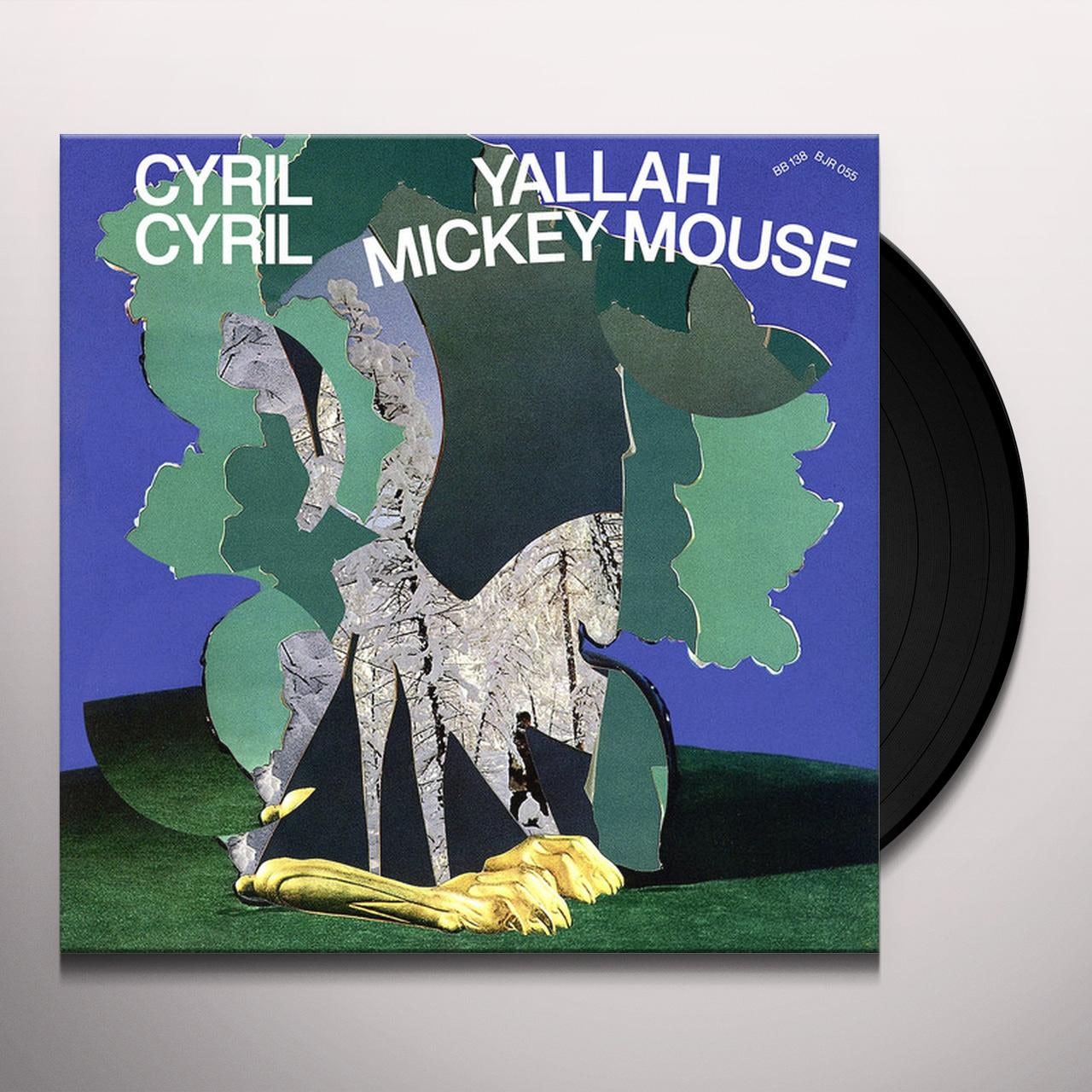 Bongo Joe Records is a reliably vibrant label from Geneva, their output an eclectic selection of global roots flavoured material. The owner, Cyril Yeterian, now fires up a new project with fellow Swiss experimentalist Cyril Bondi. Yeterian was once in Zydeco rock’n’rollers Mama Rosin who knew a thing or two about putting on a festival-slaying show, and he now leads with effects-laden banjo while Bondi lays on a range of offbeat percussion, the whole thing deep-dipped in sounds of North Africa and the Middle East. Although the talky lyrics are in French, there’s also much vocalising and, overall, something of the souk in the cumulative effect of their music, which is raw and potently rhythmic. Comes in photo/lyric/info inner sleeve.
Bongo Joe Records is a reliably vibrant label from Geneva, their output an eclectic selection of global roots flavoured material. The owner, Cyril Yeterian, now fires up a new project with fellow Swiss experimentalist Cyril Bondi. Yeterian was once in Zydeco rock’n’rollers Mama Rosin who knew a thing or two about putting on a festival-slaying show, and he now leads with effects-laden banjo while Bondi lays on a range of offbeat percussion, the whole thing deep-dipped in sounds of North Africa and the Middle East. Although the talky lyrics are in French, there’s also much vocalising and, overall, something of the souk in the cumulative effect of their music, which is raw and potently rhythmic. Comes in photo/lyric/info inner sleeve.
Madness Absolutely (BMG)
 Is this the best Madness album? It’s a question pork pie-hatted 50-something men could spend hours mulling in pubs across the land (if they were allowed in those pubs). On the new inner sleeve notes, Madness Saxophonist Lee Thompson reckons so. Released in 1980, it certainly dates from the band’s golden period, containing the genius hits “Baggy Trousers” and “Embarrassment”, as well as the equally beloved instrumental “Return of the Los Palmos 7” (which also made the Top 10). In addition, fans of the album will tell you that the song “Disappear” is as catchy and ever-lasting as any of the group’s best-known tunes. Here at theartsdesk on Vinyl, we couldn’t call it. There’s a case to be made for three or four of their albums. What is certain, though, is that Absolutely won’t be turning up in Best Albums of the Eighties any time soon because the usual arbiters of cultural taste be too busy going on about Tom Waits or Kate Bush or someone. It’s the usual situation with Madness. Their jolly ease with a tune gets in the way. But that’s rubbish really. As long as you don’t over-listen to it, there’s always much to come back to here, and I have been for four decades. From the only pop song about Premium Bonds (“E.R.N.I.E”) to the poignant slow-ska broken love of “In the Rain”, from the cartoon rock’n’roll of “Solid Gone” to hints of doubt and melancholy on “Close Escape”, “Not Home Today” and ‘Take It or Leave It”, it’s all very much worth the price of entry.
Is this the best Madness album? It’s a question pork pie-hatted 50-something men could spend hours mulling in pubs across the land (if they were allowed in those pubs). On the new inner sleeve notes, Madness Saxophonist Lee Thompson reckons so. Released in 1980, it certainly dates from the band’s golden period, containing the genius hits “Baggy Trousers” and “Embarrassment”, as well as the equally beloved instrumental “Return of the Los Palmos 7” (which also made the Top 10). In addition, fans of the album will tell you that the song “Disappear” is as catchy and ever-lasting as any of the group’s best-known tunes. Here at theartsdesk on Vinyl, we couldn’t call it. There’s a case to be made for three or four of their albums. What is certain, though, is that Absolutely won’t be turning up in Best Albums of the Eighties any time soon because the usual arbiters of cultural taste be too busy going on about Tom Waits or Kate Bush or someone. It’s the usual situation with Madness. Their jolly ease with a tune gets in the way. But that’s rubbish really. As long as you don’t over-listen to it, there’s always much to come back to here, and I have been for four decades. From the only pop song about Premium Bonds (“E.R.N.I.E”) to the poignant slow-ska broken love of “In the Rain”, from the cartoon rock’n’roll of “Solid Gone” to hints of doubt and melancholy on “Close Escape”, “Not Home Today” and ‘Take It or Leave It”, it’s all very much worth the price of entry.
Off The Meds Off The Meds (Studio Barnhus)
 New one from Stockholm’s ever-imaginative Studio Barnhus label, an imprint with a deserved reputation for balancing contemporary dancefloor cuts with more intriguing electronic curveballs. Afro-Swedish quartet Off The Meds are a case in point. They’ve been called a “techno boy band” but their debut album, on double, is closer in scope to electro hip hop, the ghosts of Cybotron and Bambaataa hiding in there, although, with lyrics in English and Afrikaans, it has a global feel that’s totally contemporary, The music varies from tuneful slowie “Karlaplan”, all wooden percussion and mellow spoken vocal, to the krunky, hedonistic party starter “EKSE”, which reminds of “Waistline Firecracker”-era Genaside II. The techno aspect is in the production, which is spiky and tough, with a steely edge, but there's also an underlying bassline funk. Full marks for the cover art too, which is atypical and excellently goofy.
New one from Stockholm’s ever-imaginative Studio Barnhus label, an imprint with a deserved reputation for balancing contemporary dancefloor cuts with more intriguing electronic curveballs. Afro-Swedish quartet Off The Meds are a case in point. They’ve been called a “techno boy band” but their debut album, on double, is closer in scope to electro hip hop, the ghosts of Cybotron and Bambaataa hiding in there, although, with lyrics in English and Afrikaans, it has a global feel that’s totally contemporary, The music varies from tuneful slowie “Karlaplan”, all wooden percussion and mellow spoken vocal, to the krunky, hedonistic party starter “EKSE”, which reminds of “Waistline Firecracker”-era Genaside II. The techno aspect is in the production, which is spiky and tough, with a steely edge, but there's also an underlying bassline funk. Full marks for the cover art too, which is atypical and excellently goofy.
Various Our New Orleans 2005 (Nonesuch)
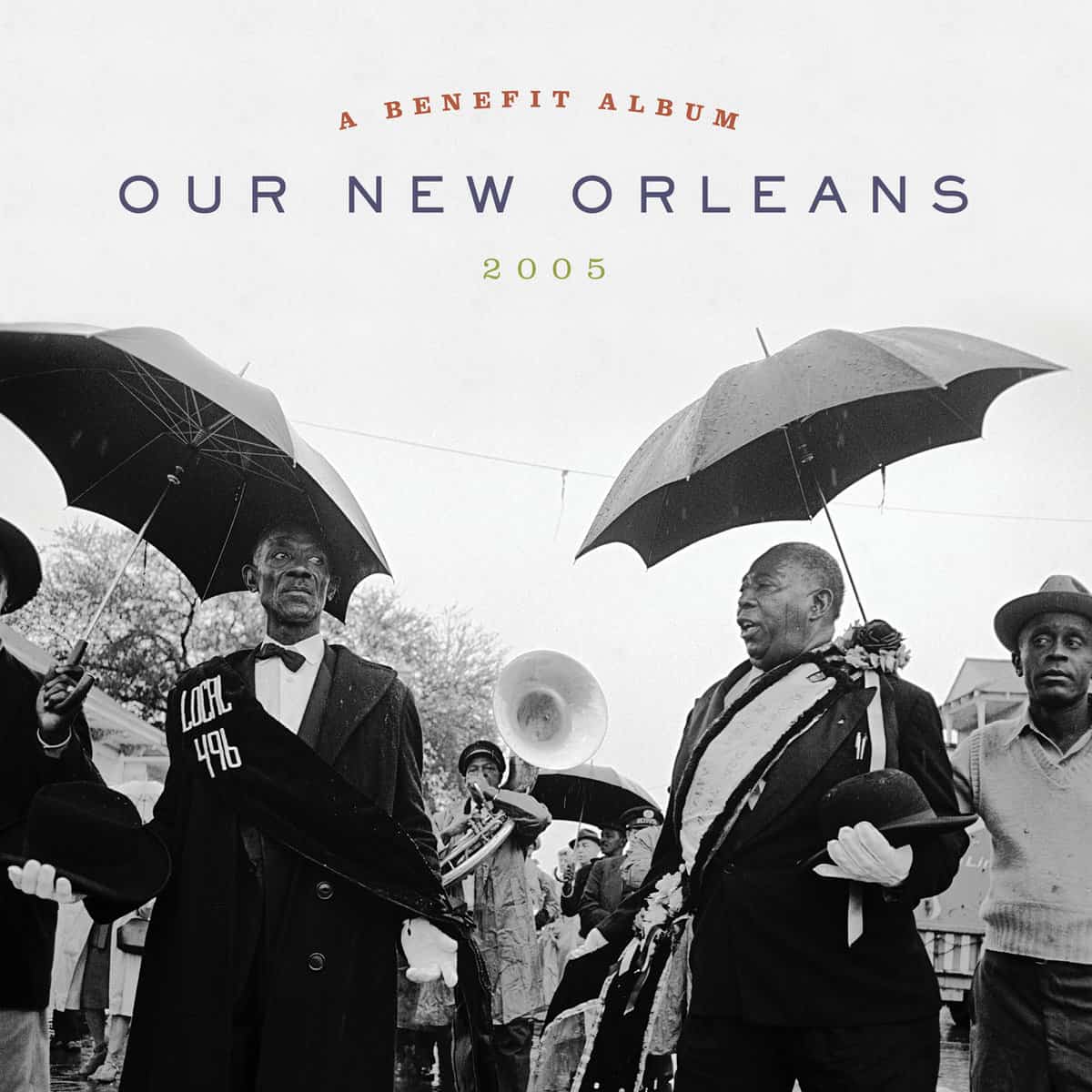 Our New Orleans 2005 saw the city’s old hand music dons gather to raise money for Habitat For Humanity to rebuild in the wake of the Hurricane Katrina disaster. The album has raised $1.5 million so far and, now, it arrives for first time on vinyl on double in photo gatefold with a 12” x 12” 12 page booklet full of great photos and thoughtful writing. The good news is that, even if you had no interest in the cause, this is simply a top notch set of New Orleans tuneage. The first side contains affecting blues-gospel dirges from Dr John, Irma Thomas and others; dirges in the sense of emulating the elegiac music the city’s brass bands traditionally play on the way to funerals. The second side bounces back, much as funeral musical corteges play upbeat music returning from the funeral. Ballistic Mardi Gras outfit Wild Magnolias’ outrageously lively, percussive “Brother John is Gone/Herc-Jolly-John” medley is a stand-out, closely followed by funkin’ material from the Dirty Dozen Brass Band and clarinettist bandleader Dr Michael White. Side C dips into Cajun with “L’Ouragan” (“The Hurricane”) by long-standing zydeco band Beausoleil, before we’re led into tender downtempo acapella and jazz moments by Allen Toussaint and others, leading to grand cinematic closer “Louisiana” delivered by its writer, Randy Newman, accompanied by the Louisiana Philharmonic Orchestra. Finally, Side D showcases five previously unreleased bonus tracks; piano jazz bluesing from Davell Crawford, OTT accordion-led party antics from Buckwheat Zydeco and Ry Cooder, shuffling Dixieland from Dr White, cool sass from Dr John, and an orchestral closer from The Wardell Quezergue Orchestra. The album's curators have successfully bottled a real sense of the city’s musical heritage, in much the same way Buena Vista Social Club once did for another region under very different circumstances.
Our New Orleans 2005 saw the city’s old hand music dons gather to raise money for Habitat For Humanity to rebuild in the wake of the Hurricane Katrina disaster. The album has raised $1.5 million so far and, now, it arrives for first time on vinyl on double in photo gatefold with a 12” x 12” 12 page booklet full of great photos and thoughtful writing. The good news is that, even if you had no interest in the cause, this is simply a top notch set of New Orleans tuneage. The first side contains affecting blues-gospel dirges from Dr John, Irma Thomas and others; dirges in the sense of emulating the elegiac music the city’s brass bands traditionally play on the way to funerals. The second side bounces back, much as funeral musical corteges play upbeat music returning from the funeral. Ballistic Mardi Gras outfit Wild Magnolias’ outrageously lively, percussive “Brother John is Gone/Herc-Jolly-John” medley is a stand-out, closely followed by funkin’ material from the Dirty Dozen Brass Band and clarinettist bandleader Dr Michael White. Side C dips into Cajun with “L’Ouragan” (“The Hurricane”) by long-standing zydeco band Beausoleil, before we’re led into tender downtempo acapella and jazz moments by Allen Toussaint and others, leading to grand cinematic closer “Louisiana” delivered by its writer, Randy Newman, accompanied by the Louisiana Philharmonic Orchestra. Finally, Side D showcases five previously unreleased bonus tracks; piano jazz bluesing from Davell Crawford, OTT accordion-led party antics from Buckwheat Zydeco and Ry Cooder, shuffling Dixieland from Dr White, cool sass from Dr John, and an orchestral closer from The Wardell Quezergue Orchestra. The album's curators have successfully bottled a real sense of the city’s musical heritage, in much the same way Buena Vista Social Club once did for another region under very different circumstances.
Oneohtrix Point Never Magic Oneohtrix Point Never (Warp) + Martin Gore The Third Chimpanzee EP (Mute) + AK/DK Shared Particles (Little Miss Echo)
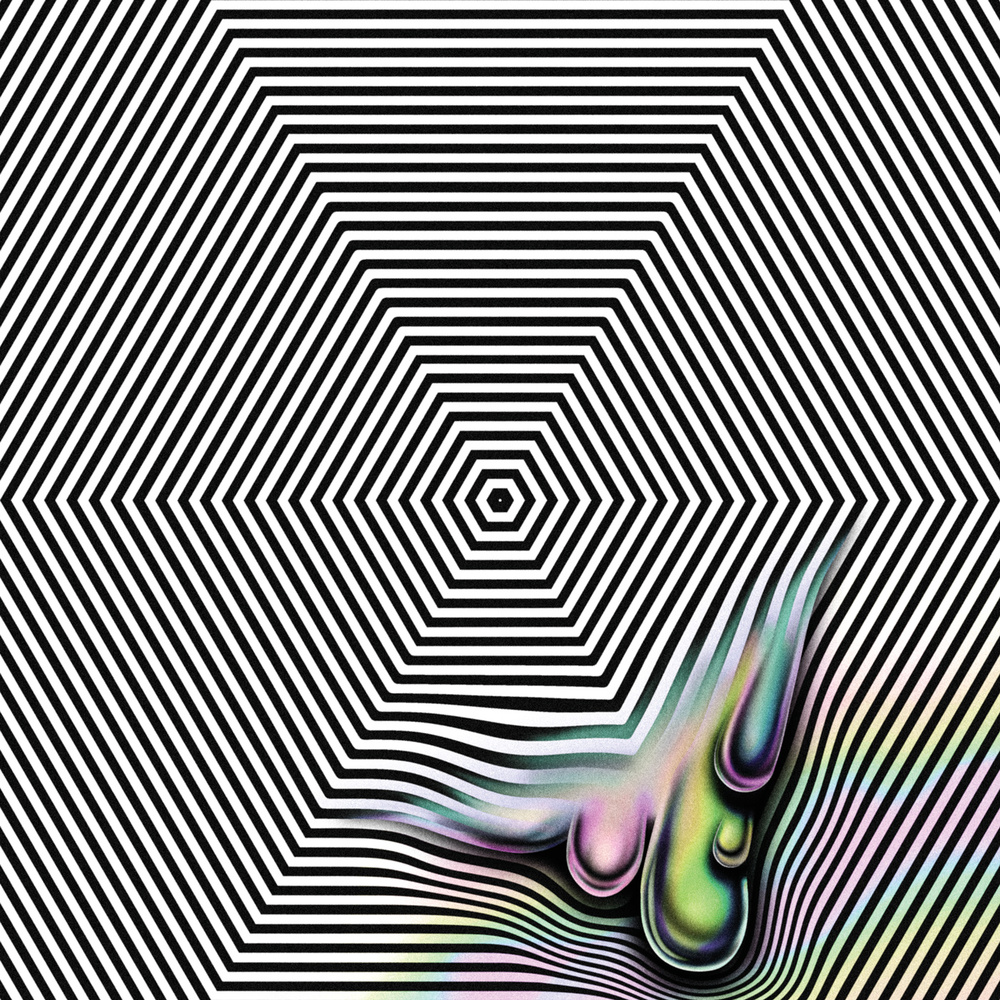 Three electronic outings of very different kinds, all well worth exploring. Daniel Lopatin – AKA Oneohtrix Point Never – is a musical Loki, a sonic trickster, which has seen him move, over the last decade-and-a-half, from peripheral post-modern New York hipster freakery to working with FKA Twigs and The Weeknd (who appears on this album) and writing the soundtrack to the Adam Sandler's (best!) film, Uncut Gems. In the past I’ve often found his work showily offbeat, but self-consciously so, unemotional, technically impressive but not great as a longform listening experience. Magic Oneohtrix Point Never, on the other hand, is a lush album, sitting somewhere between Brainfeeder Records and the best of Crystal Castles, but more lusciously robot-bleepy, fat sweet untethered tunes. It’s Nicholas Winding Refn fantasy pop with gatefold sleeve art to match, superb retro-futurist kitsch inner sleeves and 12” x 12” art/info insert.
Three electronic outings of very different kinds, all well worth exploring. Daniel Lopatin – AKA Oneohtrix Point Never – is a musical Loki, a sonic trickster, which has seen him move, over the last decade-and-a-half, from peripheral post-modern New York hipster freakery to working with FKA Twigs and The Weeknd (who appears on this album) and writing the soundtrack to the Adam Sandler's (best!) film, Uncut Gems. In the past I’ve often found his work showily offbeat, but self-consciously so, unemotional, technically impressive but not great as a longform listening experience. Magic Oneohtrix Point Never, on the other hand, is a lush album, sitting somewhere between Brainfeeder Records and the best of Crystal Castles, but more lusciously robot-bleepy, fat sweet untethered tunes. It’s Nicholas Winding Refn fantasy pop with gatefold sleeve art to match, superb retro-futurist kitsch inner sleeves and 12” x 12” art/info insert.  That Depeche Mode still often make tasty music after all these decades is quite a thing and at the heart of that is Martin Gore, who's always been driven to stay abreast of developments in the world of electronica. The band’s remixer choices over the years are his equivalent of a fanboy Tweet from Elton. The five tracks on The Third Chimpanzee EP, which arrives on azure vinyl, are all instrumentals that could, without any foreknowledge of the maker, easily hail from a rising contemporary producer on Houndstooth or Ninja Tune. That said, when you do know, it’s possibly to hear a gothy EBM subtext streaked through the clonky analogue propulsiveness. In fact, these cuts are better consumed individually as together this
That Depeche Mode still often make tasty music after all these decades is quite a thing and at the heart of that is Martin Gore, who's always been driven to stay abreast of developments in the world of electronica. The band’s remixer choices over the years are his equivalent of a fanboy Tweet from Elton. The five tracks on The Third Chimpanzee EP, which arrives on azure vinyl, are all instrumentals that could, without any foreknowledge of the maker, easily hail from a rising contemporary producer on Houndstooth or Ninja Tune. That said, when you do know, it’s possibly to hear a gothy EBM subtext streaked through the clonky analogue propulsiveness. In fact, these cuts are better consumed individually as together this  aspect starts to dominate. Brighton synth’n’drums duo AK/DK’s third album made a good few end-of-year lists in 2020 but only reached theartsdesk on Vinyl at the start of this year. It’s a step onwards and sideways from 2017’s Patterns/Harmonics. While the electronic foundation holds everything together precisely, this time round the overall sound bears a resemblance to psychedelic garage rock, laced with a strong Krautrock sensibility, and sudden bursts of blurred 1967-style cosmic vocal harmonizing. Tracks such as “Data Beach” and “Kosmiche #1” hark back more directly to Eighties electro-pop and Seventies synth wizards, respectively, but overall Shared Particles is a set that’s both messily tuneful and invigoratingly rowdy. Comes in photo/info inner sleeve.
aspect starts to dominate. Brighton synth’n’drums duo AK/DK’s third album made a good few end-of-year lists in 2020 but only reached theartsdesk on Vinyl at the start of this year. It’s a step onwards and sideways from 2017’s Patterns/Harmonics. While the electronic foundation holds everything together precisely, this time round the overall sound bears a resemblance to psychedelic garage rock, laced with a strong Krautrock sensibility, and sudden bursts of blurred 1967-style cosmic vocal harmonizing. Tracks such as “Data Beach” and “Kosmiche #1” hark back more directly to Eighties electro-pop and Seventies synth wizards, respectively, but overall Shared Particles is a set that’s both messily tuneful and invigoratingly rowdy. Comes in photo/info inner sleeve.
Emmylou Harris Red Dirt Girl (Nonesuch)
 Until the millennium Emmylou Harris was primarily a song curator and interpreter, occupying a unique place in country music, one foot in Nashville and one in the West Coast hippy folkery of her Gram Parsons origins. Her previous album, 1995’s Wrecking Ball, had been the bathed in the widescreen atmospherics of producer-du-jour Daniel Lanois. It worked well, and seemed like a new beginning, a step away from the blander, smooth country she’d slowly been drifting into. But it was still all covers. Five years later, with Red Dirt Girl, Harris finally fired out a set that was all written or co-written by herself. The songs were and are lyrically tight – songs such as “My Baby Needs a Shepherd”, “The Pearl” and the elegy for father, “Bang the Drum Slowly”, have presence – but Harris also stepped further away from pure country in terms of the production. Red Dirt Girl has a smudged sound, often underpinned with what sounds like programmed drums (even trip hoppy in places!), her distinctively strong but forlorn voice floating about in the spacey middle-of-the-road mélange she has devised. Arriving on double on transparent scarlet vinyl with a 12” x 12” lyric/photo insert, it’s a key release in Harris’s catalogue and an involving, if occasionally dolorous listen.
Until the millennium Emmylou Harris was primarily a song curator and interpreter, occupying a unique place in country music, one foot in Nashville and one in the West Coast hippy folkery of her Gram Parsons origins. Her previous album, 1995’s Wrecking Ball, had been the bathed in the widescreen atmospherics of producer-du-jour Daniel Lanois. It worked well, and seemed like a new beginning, a step away from the blander, smooth country she’d slowly been drifting into. But it was still all covers. Five years later, with Red Dirt Girl, Harris finally fired out a set that was all written or co-written by herself. The songs were and are lyrically tight – songs such as “My Baby Needs a Shepherd”, “The Pearl” and the elegy for father, “Bang the Drum Slowly”, have presence – but Harris also stepped further away from pure country in terms of the production. Red Dirt Girl has a smudged sound, often underpinned with what sounds like programmed drums (even trip hoppy in places!), her distinctively strong but forlorn voice floating about in the spacey middle-of-the-road mélange she has devised. Arriving on double on transparent scarlet vinyl with a 12” x 12” lyric/photo insert, it’s a key release in Harris’s catalogue and an involving, if occasionally dolorous listen.
Paradise Cinema Paradise Cinema (Gondwana) + Guedra Guedra Vexillology (On the Corner) + Azmari Samā'ī (Sdban Ultra)
 Three albums that take different approaches to Afro-fusion. The first will be an acquired taste. It’s not immediate and, indeed, it took three goes for me to “get” Paradise Cinema. Jack Wylie of Portico Quartet went to Dakar and recorded with percussive musicians Khadim Mbaye and Tons Sambe, who major in mbalax, a Senegalese drum-led dance music, and these eight tracks are the result. Consisting mainly of atmospherics and drums, if the listener dips in and out it can seem dull. However, bear with it and an over-arching mood is created,
Three albums that take different approaches to Afro-fusion. The first will be an acquired taste. It’s not immediate and, indeed, it took three goes for me to “get” Paradise Cinema. Jack Wylie of Portico Quartet went to Dakar and recorded with percussive musicians Khadim Mbaye and Tons Sambe, who major in mbalax, a Senegalese drum-led dance music, and these eight tracks are the result. Consisting mainly of atmospherics and drums, if the listener dips in and out it can seem dull. However, bear with it and an over-arching mood is created, 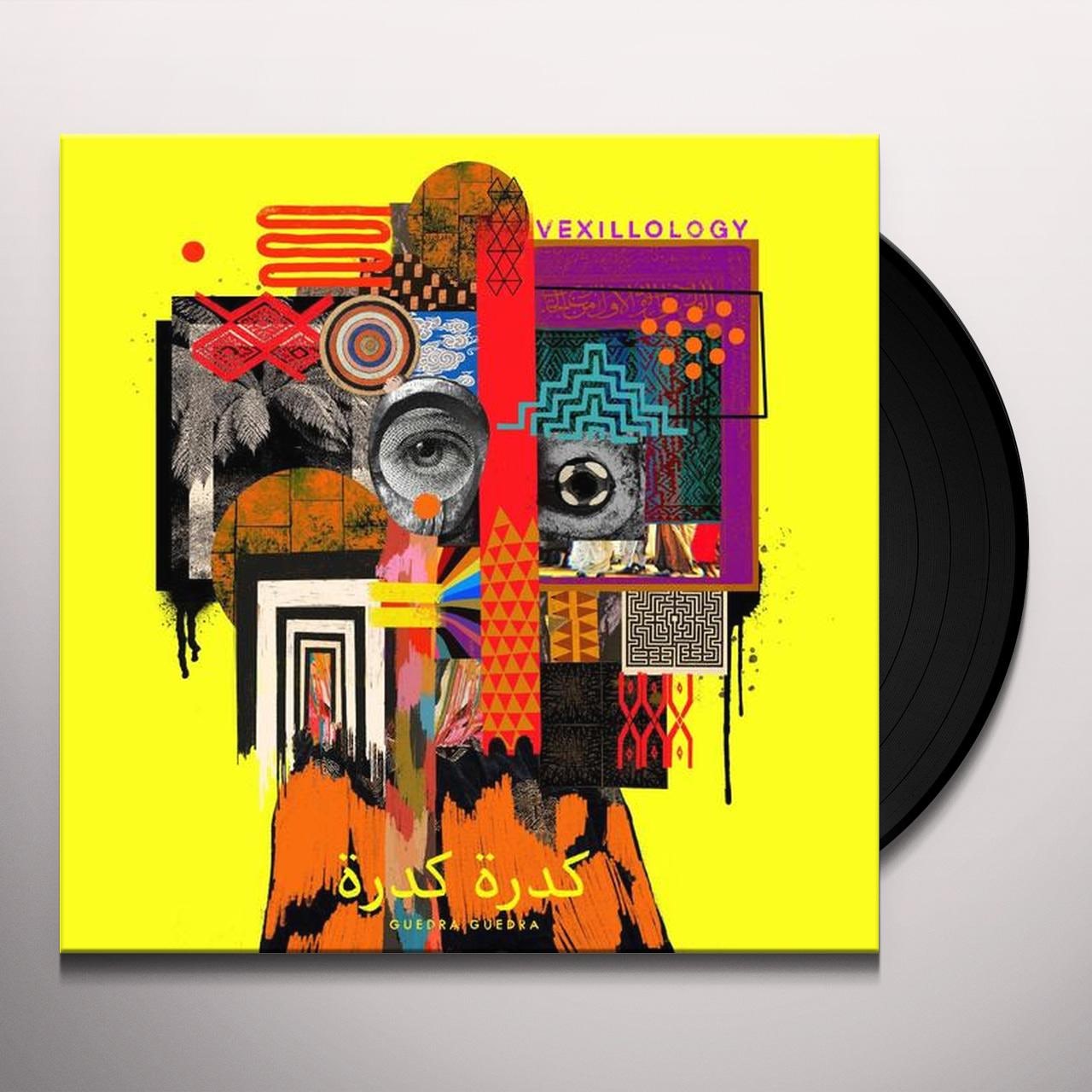 Wylie has said in interviews that it’s supposed to muster the dream state as he lay in bed in Dakar, half-awake, hearing the endless musical sounds of the city through the night. It does, indeed, summon a kind of lucid dreaming Africana which, accompanied here and there by his saxophone, eventually pulls the brain into its orbit. Pop music it is not. Guedra Guedra is Moroccan producer Abdellah M Hassak who has taken a bunch of field recordings, including of Berber musicians, and stewed it and looped it into lively sonic gumbo of beats, bell sounds, flutes and voices, underpinned with electro heft. Vexillology is much more in-yer-face than Paradise Cinema and, while not every track is a success, it’s definitely a worthwhile cherrypick.
Wylie has said in interviews that it’s supposed to muster the dream state as he lay in bed in Dakar, half-awake, hearing the endless musical sounds of the city through the night. It does, indeed, summon a kind of lucid dreaming Africana which, accompanied here and there by his saxophone, eventually pulls the brain into its orbit. Pop music it is not. Guedra Guedra is Moroccan producer Abdellah M Hassak who has taken a bunch of field recordings, including of Berber musicians, and stewed it and looped it into lively sonic gumbo of beats, bell sounds, flutes and voices, underpinned with electro heft. Vexillology is much more in-yer-face than Paradise Cinema and, while not every track is a success, it’s definitely a worthwhile cherrypick. 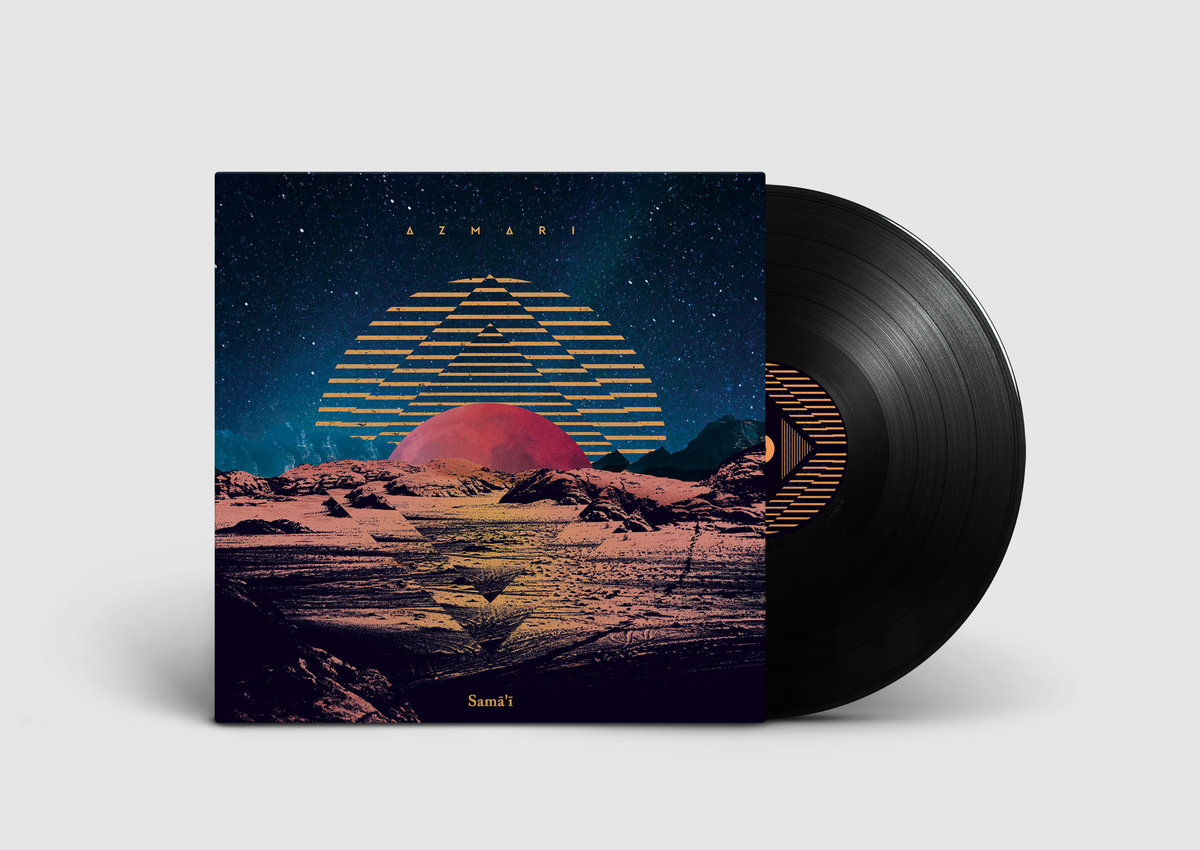 Belgian outfit Azmari brew up music that’s deep dipped in dub and Ethiopian jazz. Their second album is the most approachable of these three. Akin to fellow Belgians Black Flower, they major in jammed psychedelic instrumentals using instruments you’ve never heard of (The baglama! The ney! The berimbau!) and sound liked they’d hash cookie the brain in concert.
Belgian outfit Azmari brew up music that’s deep dipped in dub and Ethiopian jazz. Their second album is the most approachable of these three. Akin to fellow Belgians Black Flower, they major in jammed psychedelic instrumentals using instruments you’ve never heard of (The baglama! The ney! The berimbau!) and sound liked they’d hash cookie the brain in concert.
ALSO WORTHY OF MENTION
Vis-A-Vis Odo Gu Ahorow + Obi Agye Me Dofo (We Are Busy Bodies)
The titles of these albums are spelt different ways on the actual sleeves, as well as across Google, but are, nonetheless, easy enough to track down. Well, they are now that We Are Busy Bodies Records has re-issued them. They are both classics of Ghanaian highlife, the sound that lit up the 1970s beyond, combining traditional sounds with African electric guitar dance rhythms and a smattering of jazz technique. In the microverse of those interested in such things, Vis-A-Vis are well-known because K Frimpong was in the band and went on to be a big highlife face in his own right. Both albums combine a head-nodding hypnotic percussiveness with measured funkiness, interspersed with almost mod-ish Hammond-like keyboard that gives an unexpected dimension to the whole gumbo. Odo Gu Ahorow came out in 1976 and Obi Agye Me Dofo the following year. The latter would be my pick of the pair.
Sam Amidon Sam Amidon (Nonesuch): Well-travelled and well-versed US folkie Sam Amidon offers up a cross-section of old music, ranging from traditional gospel to songs whose origins are lost in long ago Afro-American life, to Taj Mahal’s “Light Rain Blues”. However, none of it is presented in a predictable folk manner. On his eleventh album, Amidon gives us a modern reading of these songs, rooted in their instrumental past, but equally touched by the work and ideas of Brian Eno and various US indie experimentalists. In that sense it has things in common with the Emmylou Harris album reviewed elsewhere on this page. Featuring his wife Beth Orton on the sweet closing cut “Sundown”, this album renders something self-consciously old into something timeless. Arrives on powder blue vinyl with a 12” x 12” art/lyric/info insert/
Various The Magician’s Magic Tape 100 (Potion): Originally one half of coulda-been-big Belgian dance-pop duo Aeroplane, Stephen Fasano is best known in the UK for his Top 10 hit “Sunlight”, featuring Years & Years. However, ever since he left Aeroplane a decade ago he's been pumping out eclectic club mixes online – Magic Tapes – and to celebrate the release of the 100th, he’s gathered together a host of exclusive tracks on vinyl on his own Potion label. Fans of French Touch flavours and filter disco will find much to love, including The Magician himself and rave-tinted material from Boston Bun. However, to these ears the real gems are elsewhere, notably the synth-pop house of “Love My Lean” by New York studio don warner case (sic – no caps) and the hip-house “Get Down” by Dutch producer Jengi. Arriving on double on art gatefold and vinyl the colour of creamy peach milkshake, there’s a sense that some of the cuts were going spare in their creators archives, but there are enough that hit home to make it worthwhile.
Teebs Ardour 10th AC ( Brainfeeder/Ninja Tune): Los Angeleno painter and collagist Mtendere Mandowa is better known by the musical community as Teebs, part of the sprawling Low End Theory family of post-hop hop experimentalists. His debut album from 2010 is much loved, a more bullishly beatsy take on Boards of Canada’s layered blurriness, very much its own thing. It’s dream state music, sounds are confused with each other, plenty of eastern-sounding percussion in there alongside synthesized washes and fuzzy strings, all adding up to a melodic looping brain-fudge. Comes on double in art gatefold on vinyl the colour of damsons, with art inner sleeves and the last side containing six extra tracks that are, stylistically, more of the same, but of equal calibre.
Baio Dead Hand Control (Glassnote)
Placing this on the turntable I had no idea that it was related to Vampire Weekend, a band theartsdesk on Vinyl has not yet found a way into. Instead, the thought process was, “This sounds a bit like Pulp gone grungily electro-pop.” Then, of course, I Googled it and it’s the third album from Vampire Weekend bassist Chris Baio. Arriving on photo/lyric gatefold in die-cut photo/info inner sleeve, it’s not electro-pop in the Eighties sense or even in the Lily Allen sense – it’s sensibilities are more indie – but it boasts propulsive songwriting, wit and, in songs such as “Dead Hand”, a forceful crunchiness.
Andy Cooper L.I.S.T.E.N. (Unique): The third solo album from Ugly Duckling MC Andy Cooper is supposedly an abbreviation of Lyrical Innovation Supplying the Ear’s Need. He announces candidly right at the start on the jazzy “Deluxe”, “I’m pretty sure nobody cares, this sound has been irrelevant for 25 years/So why bother? Why persist? What’s the use of producing this?/Well, I guess I made the album for me…” With that acknowledgement out of the way he proceeds to have a bunch of funkin’ fun, weaving words around upbeat tunesmithery not a million miles from The Allergies, with whom he’s also worked. He really can twist his word-flow about to impressive effect and L.I.S.T.E.N. is a lively frolic.
Hugar Music For the Motion Picture The Vaslulka Effect (Sony Matserworks) + John Williams/London Symphony Orchestra Star Wars: The Empire Strikes Back Remastered Original Motion Picture Soundtrack (Walt Disney)
A couple of very different film soundtracks. Icelandic musicians Bergur Þórisson and Pétur Jónsson have created a delicious, peace-inducing soundtrack to Hrafnhildur Gunnarsdóttir’s documentary, The Vasulka Effect, about Czech émigré video art pioneers Steina and Woody Vasulka. The duo have pedigree, between them working with Björk, Jóhann Jóhannsson, Ólafur Arnalds and others, and their music here is smeared piano submerged under atmospheric soundscapes and raised, here and there, by suitably spare strings. It’s lovely, calming stuff. Arrives in art inner sleeve on vinyl the colour of urine. At the opposite end of the spectrum comes John Williams' classic soundtrack to the second Star Wars film. Of course, it contains “The Imperial March”, Williams’ Wagnerian masterwork, which makes it irresistible, but there’s a whole host of his catchy classical pastiches over four sides on double gatefold. For those of a certain age, pieces such as “Yoda and the Force” and “The Battle in the Snow” will have a Proustian effect.
Various Future Bubblers 4.0 (Brownswood) + Tamil Rogeon Son of Nyx (Soul Bank Music) + Ralph Heidel Relief (Kryptox): Three albums that showcase the increasingly varied face of jazz. Gilles Peterson’s Brownswood label continues its new talent series with a mellow cross section that’s as much about soul as jazz. There’s a tune on board by Brit-Iranian Londoner Iman Houssein, “Slow Things Down”, the title of which sums things up; Side One consists of four songs over sunny, blissed-out downtempo (by Forest Law, Quko, HMD and Kiddus), while Side 2 continues in a utterly horizontal vein but is hip hop-orientated, with an Alien Called Harmony and Kin Kai, before concluding with a couple of more experimental, beatsy pieces by Houssein and, especially, Lazy H. The latter two particularly appeal to these ears. Australian viola-player Tamil Rogeon has worked with Gilles Peterson and, alongside his work in Melbourne’s orchestral milieu, he explores jazz, with Son of Nyx his second album. His six-piece band is keyboard led, with modal stylings, and snifters of vocalising on a couple of songs. It’s very capital letter JAZZ. Ralph Heidel is also classically trained, a Berlin saxophonist whose new six track mini-album smooshes jazz into electronics that are occasionally easy and bleepy but more often boast increasing climactic crunch as they progress. It’s the noisiest of these three, by far, but is also playful in its adventuring.
Jon Gomm The Faintest Idea (KScope) + Lunatic Soul Through Shaded Woods (KScope): Jon Gomm is an acoustic guitarist whose work explores the boundaries between folk songwriting, plucked classical guitar composition, experimental techniques and even new agey atmospherics. A good dipping point on this, his fourth album, might be “Dream Factories” wherein he uses the body of his acoustic guitar for percussion, singing a chorus that runs “Burn the factories down”, but then Eighties ethereal synth settings arrive and put the sound somewhere between Talk Talk and Clannad. The ghost of prog is certainly here – of course it is, it’s on KScope Records – but Gomm, while emanating an earnestness that’s slightly off-putting, delivers something unique and different. Comes in lyric/photo/info gatefold. Also on KScope is the seventh solo offering from Mariusz Duda under his Lunatic Soul moniker. Where his main band, Riverside, sound a bit like prog-metallers Dream Theater, this album is imbued with Mitteleuropean folk underpinnings that are often palatable. Think of it as a virtuosic prog rock Mumford and Sons (but not crappy like that band). Comes in art gatefold with lyrc/info inner sleeves.
Late Night Final A Wonderful Hope (Late Night Final/PIAS): J Willlgoose of Public Service Broadcasting was stranded in a different country from his main studio kit when COVID hit so he pulled out a bunch of analogue equipment he’d long ago left behind and made this delicious spaced-out album as Late Night Final. It’s redolent of the late ‘90s’ more techno orientated chill-out, the likes of Gas and Sun Electric, but instead of floating off into the ether, each of these tracks eventually explodes for a brief spell into shoegazey ecstasy (vaguely akin to early M83). All four pieces are head-nodding lovelies but the epic opening “Thank You” stands out. I kind of wish it didn’t have to explode at the end because the journey is so enjoyable! Comes on transparent yellow vinyl.
The Love Affair/Steve Ellis The Best of the Love Affair and Steve Ellis (Demon): Steve Ellis first came to prominence as the singer of late-Sixties pop band The Love Affair. He was, in fact, the only one of them to feature on their session-musician-built hits, such as “Everlasting Love” (the session men in question, he states on the colourful inner sleeve notes, were the Keith Mansfield Orchestra). The Love Affair’s sound is bright, brassy orchestral pop that owes much to Motown. Their hits take up all of Side 1. When the band split in 1969 Ellis hooked up with keyboard don Zoot Money for a band called Ellis. Their two loose, psychedelic rockers included here, “El Doomo” and “Good to Be Alive” are redolent, respectively, of Pink Floyd-meets-Led Zep and Mungo Jerry. The former is tasty in a druggy Seventies way. The rest of the album consists of two songs Ellis recorded for the naff 1970 film adaptation of Joe Orton’s Loot, and a couple he recorded with Paul Weller and mates a couple of years ago, “Lonely No More” and “Cry Me a River”. They sound, respectively, like prime time The Style Council and Seventies funk-rock, no bad thing in either case. The album comes on plasticky-looking gold vinyl.
Sofie Cult Survivor (Stones Throw) + Seafarers Orlando (Bethnel): Two projects led by sad-eyed female vocals that cut through. Sofie is a DJ and club cultural player with strong associations in the global underground electronic milieu, notably in the US West Coast post-hip hop scene. It is a surprise, then, that her debut album is full of traditionally constructed songwriting against small, sometimes chanson-like ensemble orchestrations. It’s melancholic in tone, lyrically astute, and eventually persuasive. She seems to have been through much and is now back in her home base of Vienna. There’s a bit of a David Lynch vibe going on, but Sofie’s work doesn’t have that glaze-eyed distance which one associates with that kind of music (see Lana de Rey); it all sounds very human, even wounded. A promising opening shot. Seafarers is often even sadder in tone but a very different kettle of fish. Fronted by the fragile and fluid voice of Lauren Kinsella, Seafarers is a project led by saxophonist Matthew Herd. Sparse in construction, Orlando is jazz by way of folk, a combination that here sounds studied and virtuosic but is also elegant and thoughtfully crafted. Comes in photo/lyric inner gatefold.
Bastien Keb The Killing of Eugene Peeps (Gearbox): The third album from London producer/composer Sebastien Jones is presented, visually with its cover art, as the soundtrack to a film. The film does not exist and, in fact, the album is not particularly soundtracky, coming on like a cross between Tom Waits and Bon Iver, with a touch of David Holmes thrown in for good measure, which is to say that there is much singing and growling along the way, as well as music. It veers between avant-folk pluckings, clankier interludes and some sections that actually are cinematic. It's an interesting project but one that my ears are not finding very gripping.
AND, WHILE WE’RE HERE
First a couple that have already been reviewed on theartsdesk but which are well worth having on plastic. Viagra Boys Welfare Jazz (YEAR0001), wherein Swedish blues-punkers Viagra Boys veer easily between sneery machismo and Nick Cave-ish vulnerability on their musically varied and thoroughly likeable new one. Full review here. And Bicep Isles (Ninja Tune), the second album from Northern Irish DJ/producer duo Bicep, which showcases a luscious sense of the accessible potential of post-house grooves. Full review here. Sheffield scene perennial Ed Cosens offers up a palatable set of romantically-inclined indie, folk-ishly forlorn in places, on Fortunes Favour (Distiller) which comes in lyric gatefold and smoky off-black vinyl. London-based singer-songwriter Chelou has something of Gonjasufi about his woozy lo-fi combo of plinky switched-out backing tracks, gently plucked guitar and hazy songwriting on his second album Red (Chelou). It slowly builds into something soft but effective. Be No Rain is a London musician whose style falls somewhere between the mid-Eighties and the Autotuned 2010s, coming on like fuzzy meld of Go West, INXS, The 1975, Fryars and Paul Simon’s Graceland. That makes his debut album, Strawberry Backstory, which comes on lyric inner sleeve on transparent blue vinyl, sound intriguing! It doesn’t press my buttons, but there are original elements in play here.
We welcome any and all vinyl for review. Please hit thomash.green@theartsdesk.com for a postal address.
Buy
Explore topics
Share this article
The future of Arts Journalism
You can stop theartsdesk.com closing!
We urgently need financing to survive. Our fundraising drive has thus far raised £49,000 but we need to reach £100,000 or we will be forced to close. Please contribute here: https://gofund.me/c3f6033d
And if you can forward this information to anyone who might assist, we’d be grateful.

Subscribe to theartsdesk.com
Thank you for continuing to read our work on theartsdesk.com. For unlimited access to every article in its entirety, including our archive of more than 15,000 pieces, we're asking for £5 per month or £40 per year. We feel it's a very good deal, and hope you do too.
To take a subscription now simply click here.
And if you're looking for that extra gift for a friend or family member, why not treat them to a theartsdesk.com gift subscription?
more New music
 Album: Boz Scaggs - Detour
Smooth and soulful standards from an old pro
Album: Boz Scaggs - Detour
Smooth and soulful standards from an old pro
 Emily A. Sprague realises a Japanese dream on 'Cloud Time'
A set of live improvisations that drift in and out of real beauty
Emily A. Sprague realises a Japanese dream on 'Cloud Time'
A set of live improvisations that drift in and out of real beauty
 Trio Da Kali, Milton Court review - Mali masters make the ancient new
Three supreme musicians from Bamako in transcendent mood
Trio Da Kali, Milton Court review - Mali masters make the ancient new
Three supreme musicians from Bamako in transcendent mood
 Hollie Cook's 'Shy Girl' isn't heavyweight but has a summery reggae lilt
Tropical-tinted downtempo pop that's likeable if uneventful
Hollie Cook's 'Shy Girl' isn't heavyweight but has a summery reggae lilt
Tropical-tinted downtempo pop that's likeable if uneventful
 Pop Will Eat Itself's 'Delete Everything' is noisy but patchy
Despite unlovely production, the Eighties/Nineties unit retain rowdy ebullience
Pop Will Eat Itself's 'Delete Everything' is noisy but patchy
Despite unlovely production, the Eighties/Nineties unit retain rowdy ebullience
 Music Reissues Weekly: The Earlies - These Were The Earlies
Lancashire and Texas unite to fashion a 2004 landmark of modern psychedelia
Music Reissues Weekly: The Earlies - These Were The Earlies
Lancashire and Texas unite to fashion a 2004 landmark of modern psychedelia
 Odd times and clunking lines in 'The Life of a Showgirl' for Taylor Swift
A record this weird should be more interesting, surely
Odd times and clunking lines in 'The Life of a Showgirl' for Taylor Swift
A record this weird should be more interesting, surely
 Waylon Jennings' 'Songbird' raises this country great from the grave
The first of a trove of posthumous recordings from the 1970s and early 1980s
Waylon Jennings' 'Songbird' raises this country great from the grave
The first of a trove of posthumous recordings from the 1970s and early 1980s
 Lady Gaga, The Mayhem Ball, O2 review - epic, eye-boggling and full of spirit
One of the year's most anticipated tours lives up to the hype
Lady Gaga, The Mayhem Ball, O2 review - epic, eye-boggling and full of spirit
One of the year's most anticipated tours lives up to the hype
 Slovenian avant-folk outfit Širom’s 'In the Wind of Night, Hard-Fallen Incantations Whisper' opens the door to inner space
Unconventional folk-based music which sounds like nothing else
Slovenian avant-folk outfit Širom’s 'In the Wind of Night, Hard-Fallen Incantations Whisper' opens the door to inner space
Unconventional folk-based music which sounds like nothing else
 'The Art of Loving': Olivia Dean's vulnerable and intimate second album
Neo soul Londoner's new release outgrows her debut
'The Art of Loving': Olivia Dean's vulnerable and intimate second album
Neo soul Londoner's new release outgrows her debut

Add comment